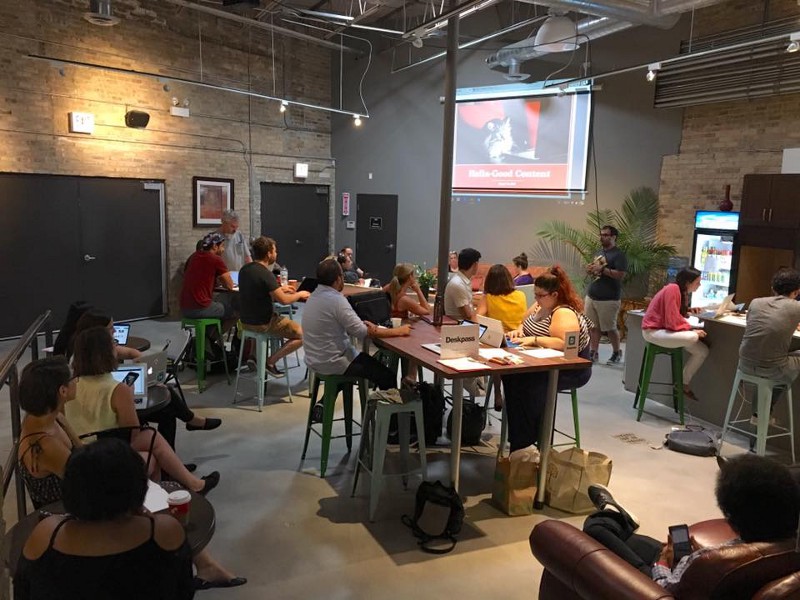Deskpass was born from the experiences of the founders of The Coop, a dedicated coworking space in Chicago. While all coworkers can appreciate the benefits of having a dedicated community, the growing freelancer economy demands variety and access to a range of communities and spaces. This is where Deskpass comes in. Founding member Sam Rosen, who also worked on Desktime, a software used for booking and managing spaces, based on work at The Coop, aims to bring the coworking world easy access to a global network of spaces.
Currently, Deskpass’s flexible membership allows the platform to partner with spaces and offer coworkers a monthly package in Chicago, Los Angeles, and Denver to give you access to all of them. There are also several plan options for people who want to cowork someplace new every day or just a few times a month. We spoke with Sam about the platform and why coworking memberships will be an integral part of the future workplace.
Hi, Sam. How long have you been operating and from your experience what have been some of the common threads that you’ve seen regarding worker’s needs?
Deskpass has been in operation a little over a year and a half. In that time, we’ve found that most of our users primarily work from home, and like it!. Instead of replacing their home office, they are looking for a place to go once or twice a week. They either want a creative boost, a place to meet clients or a work base close to other things happening in their lives. While traditionally folks who use coworking spaces value location and community, Deskpass users also value flexibility and access to lots of spaces.
As coworking has become more popularized in recent years, it has attracted more traditional workers, and corporations. Do you see a lot of corporate players who are interested in programs like Deskpass?
It’s important for those of us who work in coworking to remember that it is still a new idea and that a vast majority of people may have never heard of it before. We’re seeing more and more mobile and remote workers across industries. Pair that with companies starting to adopt alternative workplace strategies, and innovative options like Deskpass become more and more compelling.

Sam Rosen
For example, suburban companies want flexible options downtown for talent recruitment and retention. Forbes tells us at least 70% of employees would quit their current position for more flexible work arrangements. One study from GWA showed 95% of employers say remote work has a high impact on employee retention & 36% of employees would choose it over a pay raise.
Businesses that want to compete for the best people need to keep those things in mind but also don’t want to rent offices all over the place.
What are some of the experiences that you’ve had with more traditional workers that have signed up for Deskpass?
Most of our folks use Deskpass to augment an existing setup. They like working from home, or from the office most of the time, and Deskpass serves as an attractive alternative a few times a month. Maybe they need to travel for work or they just want to get out of the house. Again, for many people, coworking is still a new concept. We find that a lot of folks are trying coworking for the first time and come to wonder how they have worked so long without it.
On that same note, would you say most of your users are full-time freelancers and part-time remote workers who are able to leave the office from time to time?
We’re pretty evenly split between freelancers and remote workers. We definitely expected to be more freelancer-based when we launched and have been excited to see the benefits membership offers remote workers.
As Deskpass encourages flexible use of space, what is your take on the future of real estate in the workplace?
There’s little doubt in my mind we are in a transformative moment for our concepts of the office. For the first time ever, “work” doesn’t have to both be a thing we do and the place we do it.
We’re going to see more variance in and more kinds of ecosystems for work. I imagine folks will still have a traditional office available to them but will be equally empowered to work from home. This could be done from wherever it is that’s going to allow them to get the most work done, be more focused and have a better quality of life. An ideal environment might change based on the personality type and the job. Furthermore, my ideal environment might change based on what specific project I am working on or what my schedule feels like for the week.
Overall, we’re going to see more hybrids with less dedicated space and more awesome thoughtful drop-in environments supported by better and better technology.
Join Coworking Europe Conference for more insights, data and connections!




0 Comments